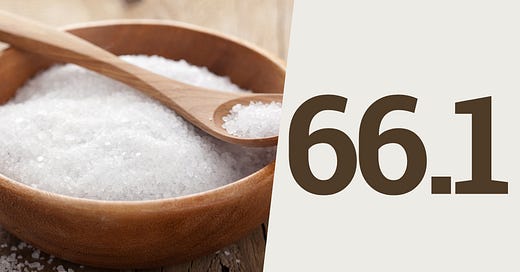Read time: 11 minutes
Good morning, 66.1ers.
Welcome to the first paid edition of 66.1 Saturdays.
If you’re a free subscriber, you’ll see a preview of today’s post, but full access to both the text and podcast versions is reserved for paid subscribers.
If you’re one of our early paid subscribers to 66.1, thanks for your support.
To upgrade your subscription from free to paid, simply click the button below to access all the features of 66.1.
This Saturday’s episode will cover:
Why we’re so afraid of consuming salt
Effects of dietary salt on blood pressure and heart disease
Actionable advice on managing dietary sodium and blood pressure
Setting the scene
Before we dive in today, it’s important we define the term on which today’s post is focused. Salt is technically “any chemical compound formed from the reaction of an acid with a base…” If you want to know more about the chemical definition of salt, Google “salt definition”.
For the purposes of today’s article, “salt” means table salt, sodium chloride (NaCl if you like chemical formulas). It’s the only salt you’d go out of your way to add to your food, and it’s the one your doctor is referring to when they’re referring to salt and your blood pressure.
And an important reminder: what follows is not medical advice. I am not a doctor. Before you go making any radical changes to your diet, consult your doctor.
Salt and your health
First off, it’s important to recognize the importance of salt in your diet. It’s required to transmit nerve impulses, contract and relax muscle fibers (including in the heart and blood vessels) (link), and have normal mental functions.
So, yes, you need salt in your life. You’d be dead without it.
The prevailing narrative
Responsible for more than 20% of deaths (roughly 700,000 per year), heart disease is the leading cause of death in the United States.

If you’re salt-conscious, it’s likely out of concern for your heart health. The thinking typically goes something like this: your doctor tells you that your blood pressure is high. You know high blood pressure is the stuff of heart attacks and strokes. And your doctor tells you that eating less salt will help lower your blood pressure. Pretty compelling stuff.
There’s plenty of science to support the “salt consumption is correlated with high blood pressure” narrative, too. This study, for example, found that reducing US participants’ dietary sodium levels significantly decreased their systolic blood pressure over just a two-week period.
While this is sound logic that is rooted in science, it lacks important nuance. We’ll spend the rest of today developing that nuance and equipping you with a better understanding of the high blood pressure conversation.
How high blood pressure works
Quite literally, high blood pressure means that, for the space your body has to circulate blood, there is an unhealthy volume of blood pressing up against the walls of your veins and arteries. High blood pressure can be caused by a narrowing of these circulatory “pipes” or an increase in blood volume. Over time, this excess pressure prompts a thickening of the walls (which further raises blood pressure) and your heart has to work harder to circulate blood. Eventually, some part of the circulatory system fails, and this is death by cardiovascular disease.
This is an oversimplification of a topic that people dedicate entire careers to, but it’s sufficient for our purposes today.
Here’s where salt comes in: we know that water follows salt. As you consume salt and the concentration of salt in your blood increases, water from your cells is pulled into the bloodstream, increasing your blood volume. Because your blood still has the same amount of space in which to circulate, this increase in volume creates higher blood pressure.
A common class of blood pressure medications, called diuretics (AKA “water pills”) targets this exact mechanism. Such pills cause you to pee out water and sodium, thus decreasing blood volume and reducing blood pressure.
Another common class of blood pressure medications act as vasodilators, meaning they widen your veins and arteries. They create more space for blood to flow. With no increase in blood volume, more space has the effect of lowering blood pressure.
Again–this is a crash course on a topic people spend lifetimes on. I don’t claim to have knocked this explanation out of the park. It’s worth asking your doctor if you’d like to learn about the mechanisms behind high blood pressure.
Correlation doesn’t mean causation

In the US, 71% of dietary salt comes from processed, packaged and prepared foods. The FDA has made a significant effort to reduce sodium content in processed foods (link). The underlying assumption in this logic is that sodium, and sodium alone, is the dangerous ingredient in these processed foods. Let’s validate this assumption against one of the higher-sodium demographics in the world, Japan. In Japan, the average daily sodium consumption is 9.6 grams (link).

The document from the Japanese government goes on to highlight the fact that 68% of salt consumption in Japan comes from seasonings (soy sauce, miso, or salt added during cooking and eating). Less than 20% of salt consumed in Japan comes from processed foods. All the while, Japanese life expectancy is roughly 8 years longer than US life expectancy (link) and the rate of deaths due to cardiovascular disease in Japan is half the rate in the US (link). It sure seems that sodium consumption alone isn’t correlated with worse health outcomes. And there’s more data that makes this point. The Intersalt study found that sodium excretion (a proxy for sodium consumption) was not significantly related to the prevalence of high blood pressure (link).
Back to the US and the FDA, the question remains, “If not salt, then what?”
Listen to this episode with a 7-day free trial
Subscribe to 66.1 to listen to this post and get 7 days of free access to the full post archives.













